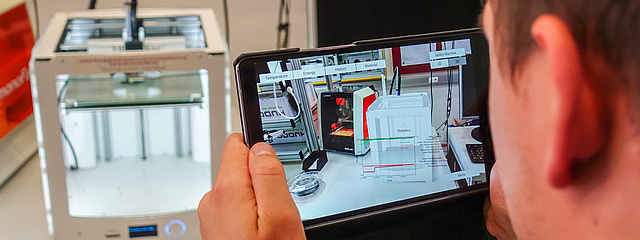
Successful completion of research project “Voladigital”
In the summer of this year, the research project "Voladigital" was successfully completed with the partners Institute for Interactive Systems and Data Science (TU Graz) and the Styrian University of Education. The project was funded by the province of Styria and the Future Funds Styria.
The goal of the project was to create training modules for digital transformation in manufacturing small and medium-sized enterprises (SMEs) for learning factories (LEAD Factory) and Makerspaces (Schumpeter Laboratory for Innovation).
To this end, the current challenges, needed competencies and training requirements of SMEs were first identified through semi-structured interviews (n=40) and a survey (n=160). The main challenges include the lack of competencies regarding digitalization, the lack of a digitalization strategy or roadmap, and the lack of resources. The required competencies include potential identification for digitalization, realization of digitalization implementation projects, generation, analysis and interpretation of data regarding the production process and interdisciplinary communication (communication with providers of software and hardware). Training should be as hands-on as possible, as well as modular and customizable, according to study participants. Further, the trainings should be attended by people from different hierarchies and departments.
After a didactic transformation of the learning objectives (competence requirements), the following practical training modules were developed: 1) Digitalization potentials & digitalization roadmap; 2) Data generation, sensor technology & IoT; 3) Data analysis; 4) Digital shopfloor management; 5) Interdisciplinary communication; and 6) Virtual reality in product development.
The training modules were tested and evaluated using qualitative and quantitative methods. The feedback from the participants was very positive with regard to the acquisition of competencies, the training experience and the increased motivation. Based on this, the modules were improved and will be offered to the industry from now on. In addition to the practical trainings for learning factories and makerspaces, videos with the theoretical content were created.
The project results could already be published in more than 10 scientific publications (journals and conference papers). Furthermore, the results were discussed with the scientific audience and industry representatives at conferences such as the Conference on Learning Factories.
We would like to thank the funding agencies as well as the project partners for the good cooperation!
- IIM goes ISAM 2022 – Participating at the International Symposium of Academic Makerspaces
- Extension of the LEAD Factory
- Successful completion of research project “Voladigital”
- Simulation as an essential part of factory planning and optimization
- Innovation Gala 2022 - The highlight of the project Product Innovation (PI)
- Whitsun Dialogue Styria 2022
- Save the Date: IIM Alumni Event 7th of June 2023
